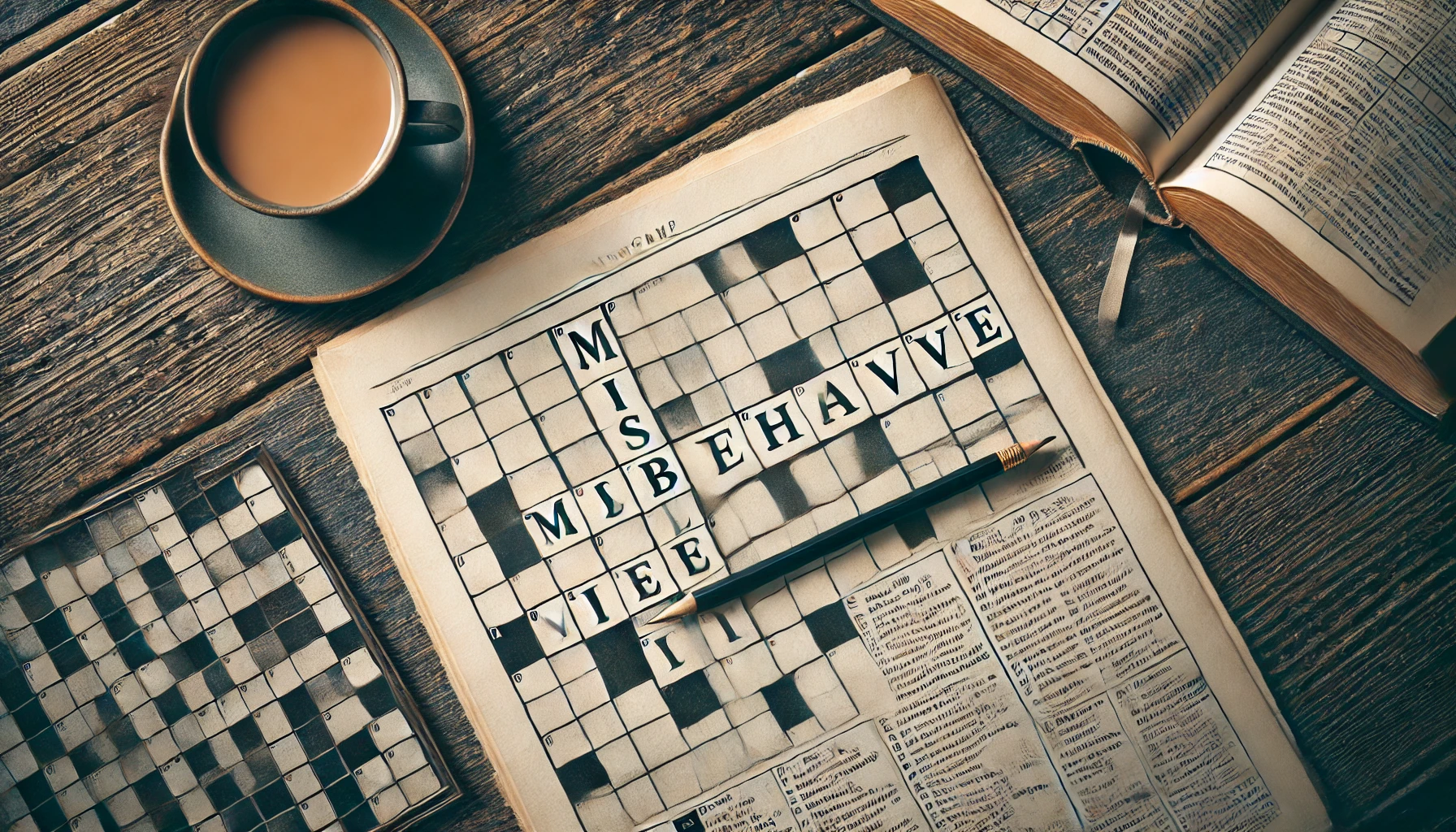The New York Times Crossword has been a cultural icon for decades, blending intellect, wordplay, and wit in a daily puzzle cherished by millions. Among its myriad of clues, words like “misbehave” often capture the attention of solvers and spark intrigue. In this article, we dive into the world of the NYT Crossword, focusing on the “misbehave” clue. We’ll explore its nuances, delve into tips for tackling similar clues, and uncover the broader appeal of crosswords for both novice and experienced solvers.
Understanding the Context of “Misbehave” in Crosswords
In the world of crosswords, clues like “misbehave” might seem straightforward but often require lateral thinking. The NYT Crossword is well known for crafting clues that can have more than one plausible answer or hint at double meanings. When clues like “misbehave” appear, they may be linked to a variety of synonyms or phrases, creating multiple possible solutions. This diversity in potential answers is part of what makes the NYT Crossword so engaging, as it requires solvers to consider different contexts and interpretations.
For example, the word “misbehave” might lead to answers like “err,” “act up,” or “rebel.” Depending on the puzzle’s level of difficulty and its themes, the answer could vary, challenging even seasoned players to think beyond the obvious. Recognizing this nuance is key to solving the clue and highlights the creative linguistic play that defines the New York Times Crossword.
Common Synonyms and Answers for “Misbehave” in NYT Crosswords
One of the joys (and challenges) of crosswords is the diversity of possible answers for any single clue. Here are some common answers solvers might encounter for “misbehave” and why each could be applicable:
- Act Up – This is a frequently used answer for clues related to misbehavior. “Act up” implies disruptive or mischievous behavior, a perfect match for the clue.
- Err – Although a shorter answer, “err” is often used as a synonym for making a mistake or misstepping, fitting with the idea of not adhering to norms.
- Rebel – This answer could appear in puzzles with themes around rule-breaking or defiance. Misbehaving can often be seen as an act of rebellion, especially in a more dramatic crossword setting.
- Misdo – While less common, “misdo” refers to doing something incorrectly or inappropriately, another take on the idea of misbehavior.
- Sin – In certain puzzle themes, “misbehave” could refer to moral wrongdoing, in which case “sin” serves as an apt, if slightly dramatic, answer.
Each answer brings a unique twist to the concept of misbehavior, allowing solvers to test different words against the crossword’s grid. Choosing the correct word relies on a blend of logic, knowledge of crossword conventions, and sometimes a bit of educated guessing.
Why the “Misbehave” Clue Stands Out in Crossword Solving
The “misbehave” clue embodies a lot of what makes crossword-solving fun: ambiguity, creative thinking, and language exploration. Here’s why “misbehave” has become such a staple in crosswords:
- Ambiguity and Range of Meanings – The word “misbehave” is broad enough to encompass various types of missteps or incorrect actions. This flexibility makes it ideal for crosswords, where clues can have multiple meanings.
- Common but Dynamic Vocabulary – Terms associated with misbehavior—like “act up” or “rebel”—are familiar yet offer unique twists depending on their use. The relatability of these terms encourages solvers to engage with the clue, and their short length also makes them versatile for fitting in the grid.
- Crossword Conventions and Wordplay – Many crosswords, particularly those in the NYT, thrive on wordplay, and “misbehave” lends itself well to clever or misdirecting clues. Sometimes, a clue like “misbehave” might hint at something outside the usual range of answers, such as slang or phrases with double meanings.
- Psychological Appeal – The clue also has a universal theme. Almost everyone has experienced moments of misbehavior, making it relatable and engaging to solvers. This psychological appeal creates a sense of satisfaction when solving because it taps into a shared experience.
Tips for Solving the “Misbehave” Clue in the NYT Crossword
If you’re a crossword enthusiast or just getting started with the NYT Crossword, here are some strategies for solving clues like “misbehave”:
1. Look for Synonyms and Variations
Start by brainstorming synonyms related to “misbehave.” Depending on the crossword’s difficulty level, the answer could range from simple words like “err” to more nuanced terms like “rebel.” Try out each option in your mind and consider which might align with the number of letters you need.
2. Analyze the Crossword’s Theme
Often, the NYT Crossword follows a specific theme, especially in its Sunday editions. Check if there’s a theme that might suggest a specific interpretation of “misbehave.” For example, if the puzzle includes references to childhood or school, the answer might lean toward “act up.”
3. Examine the Grid for Letter Patterns
Crosswords are all about patterns, and sometimes filling in the letters around a clue can provide insights. With shorter answers, letter patterns make it easier to guess the solution, even if you’re uncertain of the exact word.
4. Use Context Clues
If you’re stuck, look at the surrounding clues for hints. Sometimes, adjacent answers or similarly themed words can nudge you in the right direction. For example, if other clues have answers related to rule-breaking, you might guess that “misbehave” could mean something like “rebel.”
5. Keep Common Crossword Terms in Mind
The NYT Crossword has a preference for specific words and phrases that fit well in grids. “Err” and “act up” are frequent answers, so keep these in mind as go-to guesses when “misbehave” appears.
The Broader Appeal of NYT Crossword Puzzles
The popularity of the NYT Crossword stems from its ability to challenge, entertain, and educate. While the puzzles may seem difficult, their design encourages critical thinking and expands vocabulary. The “misbehave” clue is an excellent example of how the NYT Crossword achieves this balance. By making players rethink simple words, it engages them in a deeper analysis of language.
Crossword-solving itself is known to have several benefits, such as improving memory, boosting problem-solving skills, and even reducing stress. The mix of challenges, from straightforward clues to complex wordplay, makes the NYT Crossword a rewarding activity that keeps the brain sharp.
The Social Aspect of Crosswords
Another reason behind the crossword’s appeal is its social aspect. Many solvers enjoy discussing clues, comparing answers, and competing for solving speed with friends or online communities. The NYT Crossword community frequently debates challenging clues, and “misbehave” has often been a topic of discussion among solvers who have various interpretations of it.
Crosswords in the Digital Age
The digital age has brought NYT Crossword puzzles to mobile apps and online platforms, allowing people to engage with crosswords anytime and anywhere. With clues like “misbehave” and new features like daily mini-puzzles, the NYT Crossword has successfully adapted to modern demands while retaining its classic charm. This accessibility also introduces crosswords to younger audiences, further expanding the NYT Crossword’s fanbase.
Conclusion: Why “Misbehave” and Similar Clues Matter
The “misbehave” clue in the NYT Crossword is more than a simple prompt—it’s a testament to the intricacies of language, the joy of solving puzzles, and the enduring appeal of crosswords. By encouraging solvers to think creatively and explore various interpretations, the NYT Crossword remains both challenging and satisfying. Clues like “misbehave” remind us of the power of language and our ability to interpret words in myriad ways.
Whether you’re a seasoned solver or a newcomer, tackling a clue like “misbehave” is a great way to enhance your linguistic skills, test your problem-solving abilities, and experience the thrill of the NYT Crossword. As crosswords continue to evolve in the digital era, their blend of wit, language, and creativity promises to entertain and engage generations to come.




